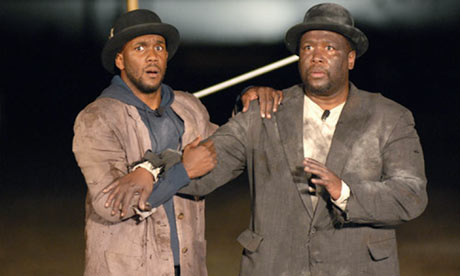
'As major new productions of Samuel Beckett's masterpiece Waiting for Godot open in Britain and on Broadway, David Smith argues that the playwright's genius lay in creating a work that, more than half a century on, still speaks to audiences, particularly in troubled times.'
David Smith, Imogen Carter and Ally Carnwath,'In Godot We Trust'
The Observer newspaper is getting excited about Samuel Beckett: specifically the theatrical revival of Waiting for Godot in the UK and New York's Broadway. The article briefly summarizes the critical reception the play received on its original opening, before focussing on its lasting significance to audiences through various traumatic historical moments. There is a general avoidance of general interpretation, and instead an emphasis on the meanings that theatre-goers have brought to the production.
Waiting for Godot, then, becomes something of an empty signifier on which people can project their emotions and their anxieties in a cathartic way; 'Like Shakespeare, Godot is a receptacle into which audiences can pour their preoccupations.' Sir Peter Hall, renowned theatre director and no stranger to Beckett's work, is quoted as saying:
'It's fairly obvious Godot can be anything you want. The great thing Beckett did was to say there is such a thing as metaphorical theatre. Godot's a metaphor for religions, philosophy, belief, every kind of thing you can think of, but it never arrives. We do die, however - this we know. But Sam didn't talk about death, he didn't give lectures about what his play meant.'
The article touches upon the audiences in New Orleans, who found catharsis in a production of Waiting for Godot in light of huge cultural tragedy and incomprehensible disaster. The Observer concludes its history with a series of summaries of recollections of some of the most memorable productions.
First, there is a description of Susan Sontag's Waiting for Godot in Sarajevo, 1993. Wendell Pearce talks about his role in Waiting for Godot in New Orleans, in the context of Hurricane Katrina. Bruno Boussagol shares his thoughts on an all-female staging of the play directed in France in 1991, two years after Beckett's death. Benjy Francis is interviewed about an all-black production of the play. And Rick Cluchey, personal friend of Samuel Beckett, talks about his experiences founding the San Quentin Drama Workshop, an amateur dramatic theatre company based at San Quentin Penitentiary.
You can read the article in full by clicking here.


